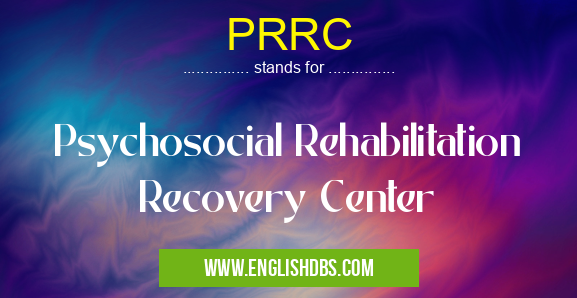What does PRRC mean in REHABILITATION
PRRC stands for Psychosocial Rehabilitation Recovery Center. It is a type of mental health facility that provides a variety of services to people with serious mental illness. PRRCs are often used as a step-down from inpatient hospitalization, or as a way to prevent hospitalization.

PRRC meaning in Rehabilitation in Medical
PRRC mostly used in an acronym Rehabilitation in Category Medical that means Psychosocial Rehabilitation Recovery Center
Shorthand: PRRC,
Full Form: Psychosocial Rehabilitation Recovery Center
For more information of "Psychosocial Rehabilitation Recovery Center", see the section below.
Services Provided
PRRCs typically provide a range of services, including:
- Individual and group therapy
- Medication management
- Case management
- Vocational rehabilitation
- Social skills training
- Housing support
Benefits of PRRCs
PRRCs can provide a number of benefits to people with serious mental illness, including:
- Reduced symptoms of mental illness
- Improved functioning in daily life
- Increased independence
- Reduced risk of hospitalization
Conclusion
PRRCs are an important part of the mental health care system. They provide a range of services that can help people with serious mental illness to recover and live fulfilling lives.
Essential Questions and Answers on Psychosocial Rehabilitation Recovery Center in "MEDICAL»REHABILITATION"
What is a Psychosocial Rehabilitation Recovery Center (PRRC)?
A Psychosocial Rehabilitation Recovery Center (PRRC) is a specialized healthcare facility that provides comprehensive rehabilitation services to individuals with serious mental illness. These centers offer a range of services aimed at helping individuals recover their functional abilities, improve their quality of life, and achieve greater independence.
What services are typically offered at a PRRC?
PRRCs typically provide a wide range of services, including:
- Individual and group therapy
- Medication management
- Case management
- Skills training (e.g., social skills, coping mechanisms)
- Education and support groups
- Vocational rehabilitation
- Residential support
Who can benefit from services at a PRRC?
PRRCs are designed to assist individuals with serious mental illness who are struggling to manage their symptoms and live independently. This may include individuals with conditions such as schizophrenia, bipolar disorder, and major depressive disorder.
How long do stays typically last at a PRRC?
The length of stay at a PRRC varies depending on the individual's needs and progress. Some individuals may only require a few months of treatment, while others may benefit from longer-term support.
What are the goals of treatment at a PRRC?
The primary goals of treatment at a PRRC are to:
- Stabilize and manage symptoms
- Improve functional abilities
- Enhance quality of life
- Promote community integration
- Increase independence
How can I access services at a PRRC?
Access to services at a PRRC typically requires a referral from a healthcare professional, such as a psychiatrist or social worker. Individuals interested in seeking services should contact their local mental health center or hospital for more information.
